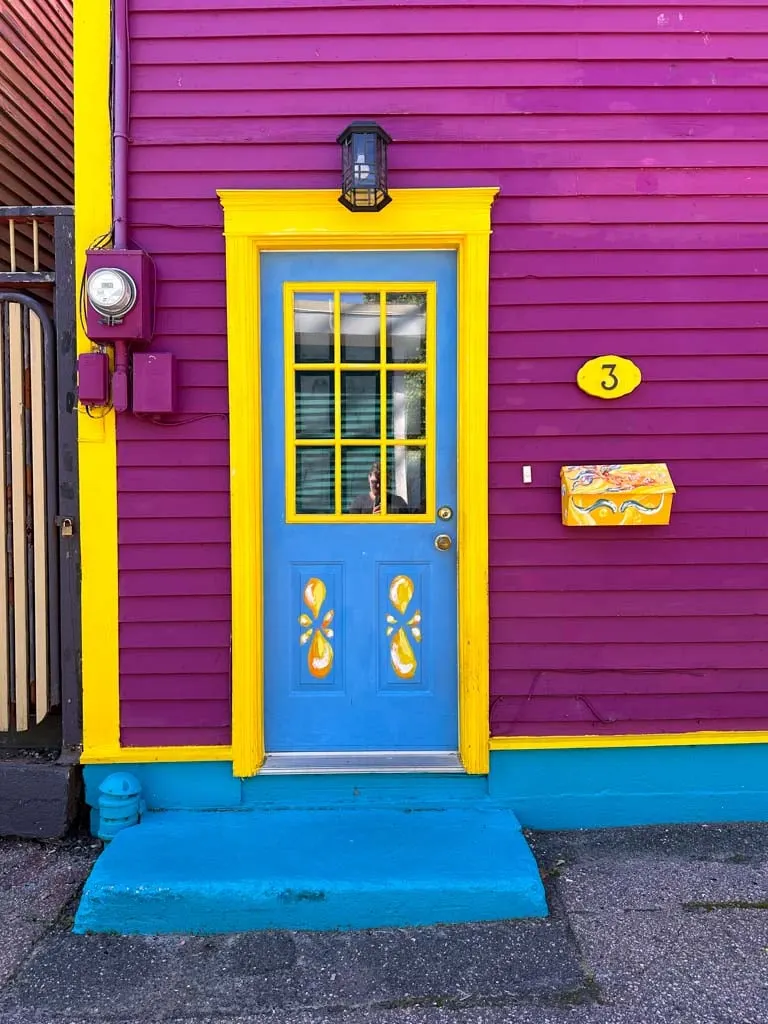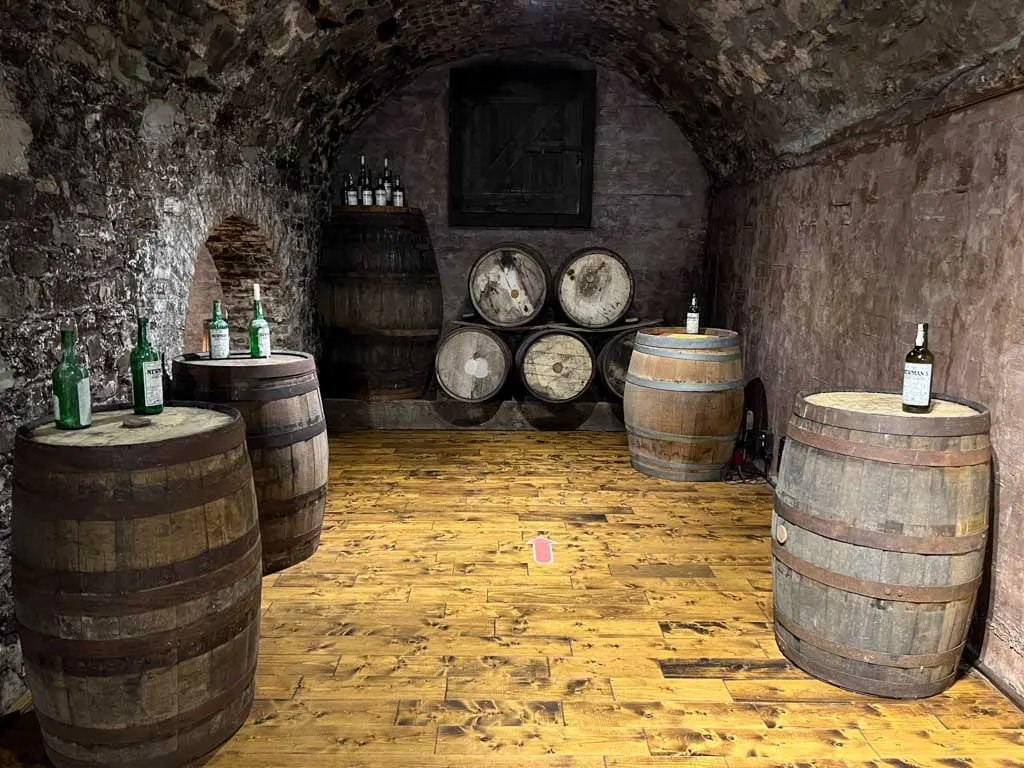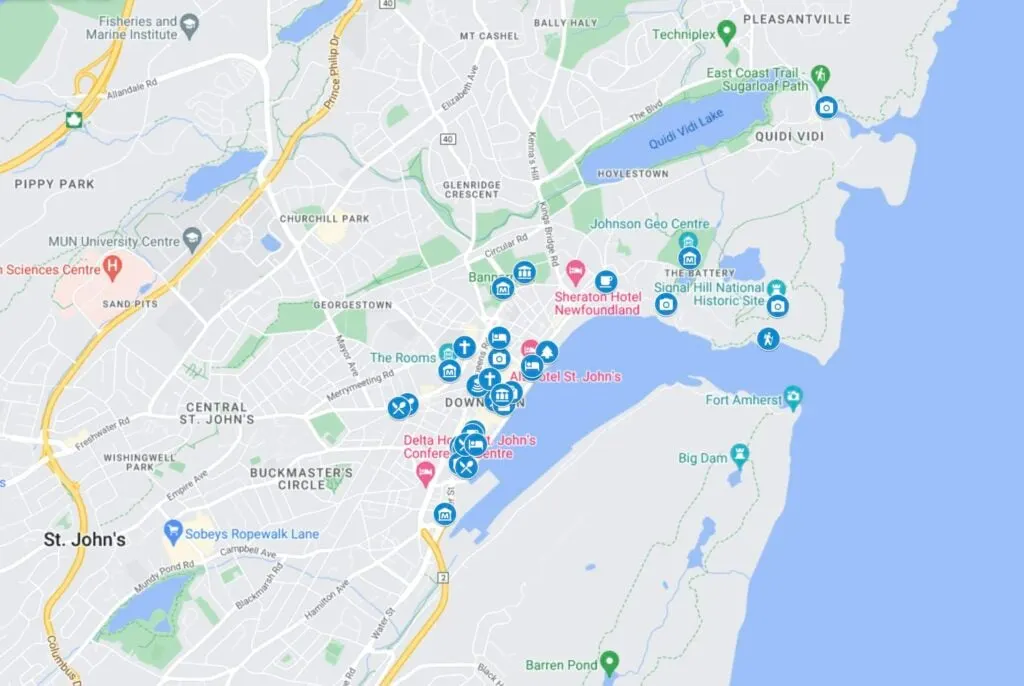St. John’s is a lot of things: the oldest city in North America, the capital of Newfoundland, and the easternmost point in Canada. It’s also a vibrant and friendly city that I love so much I’ve visited twice. From seafood to Signal Hill, here are the best things to do in St. John’s, Newfoundland.
Even though a quarter of Newfoundlanders live in St. John’s, it’s not a huge city. It has a population of just 113,000. But thanks to its history as a British colony (it didn’t join Canada until 1949) and its geographic isolation from Canada, Newfoundland has a unique culture that really shines through in St. John’s.
The city has a compact downtown that is easy to explore on foot and feels like history is around every corner – many of the places I recommend in this post are National or Provincial historic sites! Between the historic stone buildings and brightly painted Victorian townhouses, St. John’s is one of the cutest cities I’ve visited.
This guide to things to do in St. John’s, Newfoundland includes:
- St. John’s Basics: How to get there? How long to spend? Best time to go? What’s the weather like? And lots more.
- Map of St. John’s that includes all the places I mention in this post.
- Best things to do in St. John’s: Museums, cute fishing villages, historic sites, viewpoints, hikes, and more.
- Where to stay in St. John’s: My picks for the best hotels and B&Bs.
Planning a trip to Newfoundland? I’ve got a big list of the best things to do Newfoundland plus lots of travel tips for the province.
Hey there: Thanks so much to Destination St. John’s for hosting a few of my activities during my second trip to St. John’s. All opinions in this post are my own. Some of the links in this post are affiliate links, which means I earn a small commission at no cost to you. Thanks for your support. -Taryn
St. John’s Basics
How to Get to St. John’s
St. John’s is located on the East Coast of Newfoundland. Most visitors fly into St. John’s International Airport, a 15-minute drive from downtown.
You can also get to Newfoundland via Marine Atlantic ferry from Nova Scotia. The ferry terminal is in Argentia, a 1.5-hour drive from St. John’s.
Getting Around in St. John’s
Downtown St. John’s is very compact and walkable, as long as you are okay with hills and stairs. Parking downtown can be hard to find, so it’s best to walk. You can also take a taxi or an Uber.
Depending on your capacity for walking, some of the landmarks close to downtown are also easy to reach on foot. Quidi Vidi, Signal Hill, and the Johnson Geo Centre are 45 minutes to 1 hour walk from downtown. If you’re venturing further out to Cape Spear, Petty Harbour, and Bay Bulls for a whale and puffin tour, you will need a car or to go with a tour.
On my most recent trip, I did a city tour with McCarthy’s Party Tours that included Cape Spear, Petty Harbour, Signal Hill, and Quidi Vidi. The driver shared all kinds of fun facts with us and I think its the best way to see the main sights if you have limited time.
You can also book tours to Bay Bulls for whale and puffin watching that include transportation from St. John’s.

How Long to Spend in St. John’s
After visiting St. John’s twice, I would recommend you spend at least two or three days in the city. That’s enough time to visit the key sights and museums. If you want to visit some of the attractions outside of the city, such as Cape Spear or whale and puffin tours in Bay Bulls, allow yourself an extra day.
Best Time to Go to St. John’s
Summer in St. John’s is roughly mid-June to early September and is the best time to visit because the weather is the nicest and you’ll be able to see puffins and whales. However, as long as you are prepared for rough weather, you can visit St. John’s at any time of year.
St. John’s Weather
The weather in St. John’s can be all over the place, even in summer. Average summer temperatures are between 10 and 20°C. Temperatures the rest of the year are usually between -9 and 16°C. June, July and August are the driest months.
Although it is often gorgeously sunny here, it also rains frequently, especially in the spring, fall, and winter. Fog and wind are also common, making it feel much cooler than it is. Pack a rain jacket and a warm jacket like a fleece or lightweight puffy jacket, just in case.
Newfoundland Time Zone
You might be surprised to hear that Newfoundland has its own time zone. And you might not believe me if I tell you that is 30 minutes ahead of Atlantic time (1.5 hours ahead of Eastern time), but it’s true!
When time zones were established, Newfoundland was its own Dominion (it hadn’t joined Canada yet), so they got to choose, and that’s what they picked.
St. John’s Map
To help you find your way around, I made this custom Google Map of St. John’s for you. It includes every single place I mention in this post.
Best Things To Do in St. John’s
St. John’s is a small city, so it’s easy to see it in a few days. I’ve listed my picks for the best things to do below starting with things in the downtown core and branching out from there. Most things are with walking distance and the farthest attration is a 30 minute drive away.
Admire the Houses on Jelly Bean Row
Jelly Bean Row refers to the brightly coloured Victorian row houses in St. John’s. An urban legend says that the houses were painted rainbow colours to make it easier for fishermen to find them in the fog.
However, that’s not true – before the 1960s and 70s, most houses in St. John’s were painted white because that was the cheapest colour! It seems that the bright colours were part of a downtown revitalization scheme. In any case, they are gorgeous.
There is no specific Jelly Bean Row street – instead, you’ll need to wander around downtown admiring the houses. However, you can find some of the best ones on any of the streets uphill from Duckworth Street. In particular, I recommend checking out Gower Street, Bannerman Street, Colonial Street, Kings Road and Victoria Street.



Stroll Down Water Street
Water Street is the heart of St. John’s. Part of the street is a National Historic Site of Canada to recognize the city’s mercantile history in the mid-19th century. Today you can stroll down Water Street and admire the historic buildings alongside modern structures.
Water Street is also the best place to shop for cheesy souvenirs or browse boutiques selling local and artisanal goods. I recommend Newfoundland Weavery for handmade goods, and The Bee’s Knees for sustainable products.
You will also find most of St. John’s restaurants along Water Street. For laid-back vibes, I recommend Yellowbelly Brewery, a microbrewery with good pub food. If you want coffee and a sandwich, Rocket Bakery is excellent. Adelaide Oyster House has a hip atmosphere, fresh oysters, and great fusion small plates. And while I didn’t have time to visit, my friend raved about the foodie-focused fine dining at Terre.

Get Screeched in on George Street
George Street is the center of St. John’s nightlife. It’s tiny, at just two blocks long, but it’s dense – every single business is a bar and as the night wears on, the revelry overflows onto the street.
Getting “screeched in” is a Newfoundland tradition meant to welcome non-Newfoundlanders, known as “Come From Aways” in Newfoundland English. The best place to get screeched in is the bars of George Street. Christian’s Pub is particularly popular.
Screech is the Newfoundland name for high-alcohol spirits, usually dark rum. The “screeching in” process has several steps. Fist, you kiss a codfish (it’s usually frozen), and then take a shot of screech. There’s also a short recitation about loving Newfoundland. In some places, you finish by eating a cube of bologna, nicknamed Newfoundland steak. When you’re finished, you’ll get a souvenir certificate.
It’s a silly tradition and is mostly for tourists, but it’s still lots of fun. I got screeched in on my first trip to Newfoundland and I have to say that kissing the cod isn’t as gross as the Sourtoe Cocktail, which I did in Dawson City Yukon, a few years later.
Walk Along the Harbour
St. John’s is a port city. Most of the island’s goods are shipped through here and it’s also a hub for ships supplying the offshore oil and gas industry. It’s worth a walk along the harbourfront to check out the action. If you’re curious about where the ships are going, you can look them up on Vessel Finder.
Due to security, you can’t get up close to the ships. But you can walk along Harbour Drive and check out the huge ships through the railing. Or head to Harbourside Park on Water Street. It’s the only place you get all the way down to the water and is my favourite place to look out at the harbour. It also has great statues of a Newfoundland dog and a Labrador retriever dog.

Admire the Historic Architecture
St. Johns is one of the oldest settler-founded cities in North America. It was seasonally settled in 1497 and formally established in 1583. While most of the city’s buildings aren’t quite that old, there are lots of notable historic structures.
Finished in 1855, Basilica of St. John the Baptist sits on a hill high above the city on Military Road near The Rooms Museum. It is a National Historic Site of Canada and is built in the Romanesque style. It is the second-largest church in Canada.
The Anglican Cathedral of St. John the Baptist is also worth a visit. Located on Gower Street, it dates back to 1850 and has Gothic Revival architecture.
The St. John’s Courthouse on Water Street is also a National Historic Site of Canada. Finished in 1904, the stone building was designed in the Romanesque Revival style
You can also stroll around Government House, which sits in the middle of sprawling grounds and gardens on Military Road. It is the home of the Lieutenant Government of Newfoundland.

Visit the Newman Wine Vaults
The Newman Wine Vaults is a provincial historic site that’s worth a visit. The legend is that a Portuguese ship loaded with port ended up overwintering in St. John’s in the late 1600s. The port tasted better after aging in Newfoundland, so Newman and Company of England built stone wine vaults and aged their port in Newfoundland for nearly 300 years.
My husband visited the wine vaults during our last trip to Newfoundland while I was at a conference. He said the guided tour was really interesting and he loved the free sample of port at the end.

Learn About Newfoundland’s History at the Colonial Building
Dating back to 1850, the Colonial Building housed the colonial government before Newfoundland joined Canada. Today, it is a provincial historic site that you can visit on a guided tour. A recent renovation has restored some of the rooms to their 1880s finishes including some elaborate ceiling frescos.
This is another spot that my husband visited without me while I was at a conference. He came back with all kinds of facts about the history of Newfoundland that I didn’t know. As Canadians, our education about Newfoundland starts in 1949 when it voted to join Canada. But they have a long and interesting history as a British Colony and then as a Dominion that you can learn about here.

Enjoy Dinner and a Show at Spirit of Newfoundland
I’m not usually a dinner-and-a-show kind of gal when I’m travelling. But on my most recent visit to St. John’s, I attended a conference where Spirit of Newfoundland provided the entertainment on two of the nights and it was great.
Music is such a huge part of Newfoundland’s culture, and this is a great way to experience it. Spirit of Newfoundland has several different productions, each with a live band, skits, singers, and a three-course dinner. You’ll learn a bit about Newfoundland and laugh a lot.
Wander Through The Rooms Museum
The Rooms is the largest museum and art gallery in Newfoundland. The building is designed to look like a giant version of the fishing shacks that traditionally dotted Newfoundland’s shoreline. These shacks were known as fishing rooms, which explains the museum’s name.
I made time to visit The Rooms on both of my visits to Newfoundland, and I really enjoyed it. The exhibits about Newfoundland’s history are well done. As I mentioned, as a Western Canadian, I don’t know that much about Newfoundland and it was fascinating to discover the way their colonial and fishing history has shaped their culture.
The museum also has several art galleries showcasing the works of Newfoundland artists. I enjoyed these spaces way more than I thought. Altocumulus by Max Streicher was particularly cool – it’s a billowing sculpture of clouds that you can walk under.
One of the best reasons to visit The Rooms is the incredible view from the terraces on the fourth floor. Be sure to visit both the north and south terraces since they have different perspectives on the city.


Explore the Battery Neighbourhood
The Battery is one of St. John’s most interesting neighbourhoods. (In Newfoundland English it’s pronounced “batt-ree” not “bat-ter-ee”.) The entire neighbourhood clings to the side of Signal Hill on the side of a cliff.
Historically this area was an important part of the city’s defense. There were gun emplacements here and at one time, a defensive chain stretched 174 meters across the harbour’s mouth.
I loved wandering between the colourful houses, taking photos, and enjoying the view of the harbour below. It’s also the start of the North Head Trail to Signal Hill. (More on that hike below.) Stop at The Battery Cafe for coffee and a muffin. They also have live music a few nights a week.

Enjoy the View at Signal Hill
Signal Hill stands out from most places in St. John’s. The 167-meter-tall hill has a commanding view of downtown St. John’s, the harbour, the narrows, and the wild Atlantic Ocean beyond. Historically it was strategically important for the defense of the city.
Most of the hill is a Canadian National Historic Site and there are info boards along the various paths that explain the history of the hill. The stone Cabot Tower on top of the Hill also has some good interpretive displays. Until 1958, the flag poles on the top of the tower were used to communicate with ships offshore by raising and lowering different coded flags.
While the history of Signal Hill is interesting, the reason most people visit is the incredible view. Be sure to walk the paths around the summit and down to the Queen’s Battery – they all have different views.



Hike the North Head Trail
The North Head Trail takes you up and around Signal Hill. The hike starts right from downtown St. John’s, in the Battery neighbourhood. From there, you hike through the narrows and then start your ascent of Signal Hill on several sets of wooden stairs.
There are lots of incredible viewpoints along the way and even a set of iconic Parks Canada red chairs to take a break at. I loved this trail and it made my list of the best hikes in Newfoundland.
The North Head Trail is actually part of two much longer trail systems. It sits roughly in the middle of the 270-kilometre-long East Coast Trail that follows the East Coast of the Avalon Peninsula. The North Head Trail is also part of the Trans Canada Trail, which meanders 28,000 km across Canada.

Go Underground at the Johnson Geo Centre
On my first visit to Newfoundland, we visited the Johnson Geo Centre. Most the building is underground, carved into the rocks of Signal Hill. The exhibits explain Newfoundland’s geology (including why it is nicknamed “The Rock”) along with info about the solar system, the formation of the earth, and Newfoundland’s oil and gas industry.

Visit Quidi Vidi Village
Pronounced “kiddy viddy” in Newfoundland English, Quidi Vidi is an old fishing village right next to downtown St. John’s. It’s an easy 45-minute walk along Quidi Vidi Lake to get there. You can also take a taxi or bus route 15 or visit as part of a city tour. There isn’t much parking, so it’s best to go car-free.
Stroll along the water to admire the picturesque old fishing shacks, many of which are now summer cottages. Go for a beer at Quidi Vidi Brewery, a craft brewery inside a former fish plant. Shop at the Quidi Vidi Village Artisan Studios. Or go for a high-end dinner at The Mallard Cottage, a historic home that is now one of Canada’s best restaurants.

Stand on the Eastern-Most Point in Canada at Cape Spear
Cape Spear is the easternmost point in Canada and North America (excluding Greenland). It’s a 20-minute drive from downtown St. John’s. There is no public transport so you’ll need to drive yourself or take a tour to get there.
There are several viewpoints where you can look out at the ocean or down the rocky coast. It’s also worth following the footpaths around the site to see the view from different angles.
The lighthouse at Cape Spear is the oldest surviving lighthouse in Canada and is a National Historic Site of Canada. You can take a guided tour to learn about what life for the lighthouse keepers would have been like. As well, it was an important defensive gun battery during World War II and you can still walk through the underground bunkers.

The viewpoint at Cape Spear.
Explore an Old Fishing Village at Petty Harbour
The tiny (and adorable) village of Petty Harbour is just down the road from Cape Spear, so it makes sense to visit both at once. Spend a few minutes wandering along the waterfront where you can watch lobster fishermen unload their catch.
Get a meal at Chafe’s Landing restaurant. It’s one of the best places to eat freshly caught seafood (especially fish and chips or lobster rolls) in the St. John’s area.

Take a Whale and Puffin Tour in Bay Bulls
Bay Bulls is an easy 30-minute drive south of downtown. It’s the closest place to St. John’s to take boat tours in Witless Bay Ecological Reserve where you can spot whales, puffins, and lots of other seabirds.
Boat tours run several times a day between May and September and some include transportation from St. John’s. We did this tour on our first trip to Newfoundland and that’s when I fell in love with puffins. (It was my first time seeing them.)
You will see puffins or other seabirds on all tours. But of course, but whale sightings aren’t guaranteed. The best time to see whales is July and August. And if you visit in the spring and early summer, you might also see icebergs.
Pro tip: If you’re prone to motion sickness, bring some Dramamine (sold under the brand name Gravol in Canada).
Eat Seafood
Newfoundland exists because of the cod fishery. Cod (and to a lesser extent lobster) are king here, and you’ll be missing out if you don’t try some. You can get cod any time of year, but lobster is only in season between April and July.
Many Newfoundlanders don’t really like fish that much, and aren’t into lobster since historically it was a lower-class food. But they do love fish and chips. There is a fierce debate about where to get the best fish and chips in St. John’s. But most people will agree that either the Duke of Duckworth, Ches’ Famous Fish and Chips or Leo’s Restaurant is the best.
If you’re looking for a classic poached lobster dinner, head to the St. John’s Fish Exchange Kitchen and Wet Bar or Saltwater Restaurant, both on Water Street.
It’s a bit out of town, but Chafe’s Landing restaurant is known for their lobster rolls. (That’s a lobster salad sandwich served on a dinner roll.)
You’ll also find great seafood on the menu at pretty much any restaurant in the city. Locally grown mussels and scallops are great, either on their own, in pasta, or in seafood chowder. If you’re feeling a little bit adventurous, try the deep-fried cod tongues. They have a bit of a calamari vibe.

Where to Stay in St. John’s
St. John’s has tons of accommodation options from huge international chains to boutique hotels to quaint vacation rentals. Here are a few places I recommend:
Alt Hotel: With modern rooms (many with great views) and a great location on Water Street, Alt Hotel is the coolest hotel in St. John’s. Check rates.
Murray Premises: Set inside a collection of historic mercantile buildings in the heart of downtown, some rooms at the Murray Premises have original details like exposed brick and wooden beams. Check rates.
Jellybean Row Townhouse: Many of the colourful townhouses on Jellybean Row are Airbnb vacation rental apartments with full kitchens and hang-out spaces. Check rates.

Final Thoughts
If you’re visiting Newfoundland, devote a few days to St. John’s. It’s a small city, but it has so much history. I don’t always love spending time in cities when I travel, but I love this one. (Perhaps it’s because you can hike right from downtown?)
If you’ve got questions about the best things to do in St. John’s ask in the comments. I’d love to help.
READ NEXT:
- 20 Incredible Things to Do in Newfoundland
- 12 Things To Do in Trinity, Newfoundland
- 10 Things To Do in Bonavista, Newfoundland
- 10 Things To Do in Twillingate, Newfoundland
- Things to do on Fogo Island, Newfoundland
- Things to Do in Corner Brook, Newfoundland
- Things to Do in Gros Morne National Park
- 16 Best Hikes in Newfoundland
- 10 Things to Do in Penticton in Summer - July 16, 2025
- Lake O’Hara Packing Lists for Hikers and Campers - April 25, 2025
- BC Parks Day Passes 2025 – Everything You Need to Know - April 24, 2025


